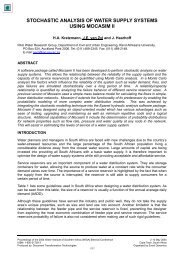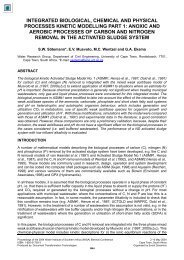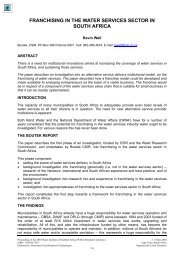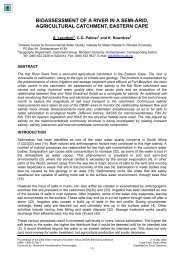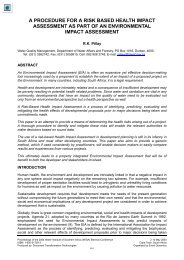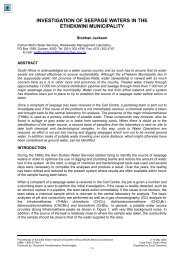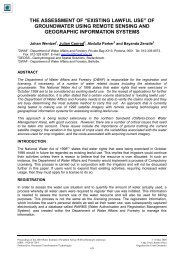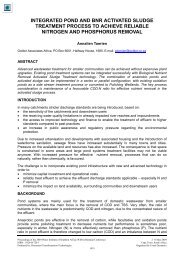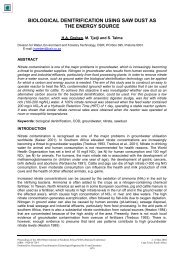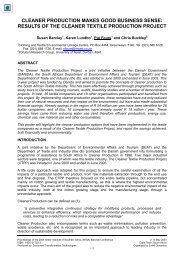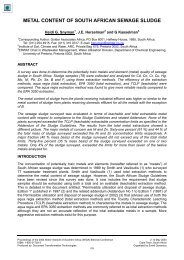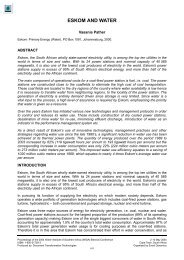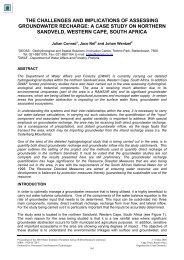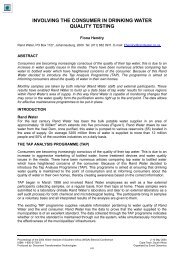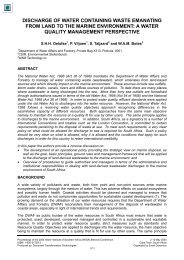ADOPT-A-RIVER PROGRAMME LAUNCH - eWISA
ADOPT-A-RIVER PROGRAMME LAUNCH - eWISA
ADOPT-A-RIVER PROGRAMME LAUNCH - eWISA
Create successful ePaper yourself
Turn your PDF publications into a flip-book with our unique Google optimized e-Paper software.
<strong>ADOPT</strong>-A-<strong>RIVER</strong> <strong>PROGRAMME</strong><br />
<strong>LAUNCH</strong><br />
17 MARCH 2010<br />
Nadene Slabbert<br />
Department of Water Affairs<br />
Directorate: Resource Quality Services<br />
slabbertn@dwa.gov.za<br />
+27(0)12 808 9619
The Adopt – a – River programme<br />
• The “Adopt-a-River” programme aims to create<br />
awareness among South Africans of the need to care<br />
for our scarce water resources and to actively<br />
participate in the protection and management of our<br />
water resources<br />
• Programme is based on community participation,<br />
training, partnerships, and focused action plans
Vision of the national initiative<br />
Provide an enabling environment for participants who want to preserve/<br />
upgrade the condition of their river reach/es through:<br />
• Guide the resource protection activities in river corridor<br />
• Coordinate conservation & wise use activities between all stakeholders<br />
• Shape the relationship between people and resources by means of<br />
communicated norms and standards<br />
• Create a platform to obtain patrons and resources needed<br />
• Develop materials (such as guidelines) for use by all role players<br />
• Source expertise to guide through implementation & refinement<br />
• Link the programme to other programmes with similar objectives<br />
• Facilitate sharing of lessons learnt/experience
Phases<br />
• Phase 1: Completed in 2007, entailed drafting a Strategic Framework for<br />
the development of the Adopt-a-River programme. It spells out specific<br />
objectives relating to active participation by water users in the care of our<br />
water resources.<br />
• Phase 2: Commenced in 2008 and focuses on the development of an<br />
implementation plan<br />
• Phase 3: Piloting of the Adopt-a-River programme commence during the<br />
National Water Week 2010. The programme design and the<br />
implementation plan will be tested in selected rivers with development of<br />
tools, techniques and training material will take place on an ongoing basis,<br />
as well as information and task sharing with interested parties.<br />
• Phase 4: In this final phase the Adopt-a-River programme will be<br />
expanded to any area where interested parties would want to participate<br />
in the Adopt-a-River programme
Governance<br />
• Implementation is through a national co-ordinator (and later<br />
provincial co-ordinators) – probably DWA appointed (scientific<br />
background)<br />
• The co-ordinators will be responsible for engaging<br />
volunteers/stakeholders for monitoring (either make use of<br />
existing structures or through new establishment)<br />
• Stakeholders can include Government Departments,<br />
Municipalities, Water Associations, NGO’s, Universities &<br />
Educational centres, Industry and the broad public<br />
• Pilot projects are envisaged to become self-sustainable after a<br />
period of time
Key principles of a sustainable programme<br />
• Institutional/governmental support and guidance<br />
• Start small<br />
• Training and education<br />
• Advocacy<br />
• Keep your goals realistic<br />
• Secure funding<br />
• Lengthy process – action plans<br />
• Commitment of stakeholders/volunteers
Key principles of a sustainable programme<br />
• Responsibilities towards stakeholders/volunteers<br />
• Stewardship<br />
• Incentives<br />
• Make connections<br />
• Partnerships<br />
• Co-ordination<br />
• Don’t underestimate local stakeholders/volunteers<br />
• Learn from local experiences of similar initiatives
Resources available from co-ordinator<br />
• Marketing expertise and resources to attract patrons<br />
• Links with related organisations and programmes<br />
• Awareness creation<br />
• Professional trainers and facilitators & recognition<br />
• Tailor made training curriculum<br />
• Training facilities if necessary (otherwise on-site)<br />
• Monitoring and feedback<br />
• Mechanism to facilitate sharing of knowledge and expertise<br />
• Legal advice and labour contracts<br />
• Adopt-a-River website<br />
• Data repository and information management (future)
Active support ultimately envisaged from roleplayers<br />
(once programme is fully implemented)<br />
• Knowledge/information sharing<br />
• Awareness creation/marketing<br />
• Managerial / administrative support<br />
• Resourcing - quantify resource requirements and priorities<br />
• Long term funding – procurement, allocation and<br />
disbursement<br />
• Networking - links to other existing monitoring programmes<br />
or even Adopt-a-River groups<br />
• Physical assistance with execution of projects within river<br />
reach<br />
• Data management and reporting/feedback
Reasons for participation<br />
• Interest will be expected to be mainly issue driven –<br />
such as visible pollution<br />
• Real interest from the community in a specific river<br />
corridor<br />
• Problems in the river are related to diffuse pollution<br />
• The programme has to be able to contribute by<br />
raising awareness – and result in behaviour change
Activities expected within river reaches<br />
• Short-term water quality monitoring<br />
• Clean-up activities (project based)<br />
• Awareness creation activities (project based)<br />
• Long-term monitoring<br />
• Training of volunteers/project leaders<br />
• Most stakeholder/volunteer data will be used to educate the<br />
community and to screen for potential problems. Better<br />
quality data may eventually feed into national programmes<br />
such as the River Health Programme<br />
• Sharing of experiences - communication
Available training materials (currently)<br />
• Volunteer monitoring co-ordinator’s manual<br />
• Sampling manual for volunteers<br />
• Report on Training Material and Training<br />
Needs – to be implemented over time
In the end, the success of the programme<br />
will be in the hands of “ordinary” people<br />
doing “extraordinary” things (with a little<br />
help for a little while). And today we are<br />
all here to witness the first example of<br />
that.
Thanks<br />
Nadene Slabbert<br />
Directorate: Resource Quality Services<br />
slabbertn@dwa.gov.za<br />
+27(0)12 808 9619



